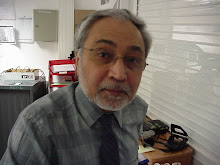Dear Dr. Nalin Thanki,
Sorry for a delayed reply to your mail. I had to be out of station for some time and could not attend to my mails. I am fully in agreement with your views on Science that one can do good science without borrowing anything from Vedanta. But the following points remain as true:
A. Science can illuminate only a small part of the reality and it can never ever reveal the whole truth. If one is fully satisfied with this situation, further discussions are unnecessary.
B. Some basic inputs into science (the paradigm shifts) come from outside of sciene ( it could be vedatic ideas as well). Thus the concepts of simplicity, truth, beauty, symmetry, unification etc. are not of science itself but are the contributions from a wider percepective. Fully empirical things also are acceptabel as science, but human mind remain unsatisfied and seeks models with better 'values'
C. Human mind is at the root of everything and any understanding of this unique phenomenon in the universe will throw open much wider vistas on reality. Thus there is room for philosophy and vedanta which can accompany science if not within it. Von Neumann knew about this long ago and he has prooved a theorem in 1948 that an essential ingradient in any experimental system is the human conciousness without which the whole experimental set up is totally meaningless. This prompted J.D. Bradley to comment that "a universe simple enough to be understood by human mind is too simple to produce a mind which is able to understand it".
Science is not able to provide any satsfactory answer to the question "Why all these laws ?".Do they operate only in inert matter or can they affect more compex systems like human mind?
I agree that these questions are not of much relevance to operational part of science in a lab, but are of great importance to our undersatding of the universe and its functioning. Our ancient seers had clear ideas on these fundamental questions which have remained essentially the same in spite of the march of Science and Technology upto 21 st century. No one appears to have made any improvements to their original answers.
A profound and deep discussion on such matters in English is available from the writings of Sri Arabindo who himself was a great revolutionary. He accepts science and goes beyond it.
I may not have provided answers to your satisfaction, neverthless I have tried to point to you the directions in which one can try to seek answers. Best regards
GIRIJAVALLABHAN
Subscribe to:
Post Comments (Atom)

No comments:
Post a Comment